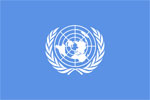
As previously discussed both here and at UN Dispatch, the challenges faced by United Nations peacekeeping missions remain immense. United Nations peacekeeping chief Alain Le Roy recently spoke to the Security Council, issuing a plea to find a solution to the increasing gap between expectations and abilities of blue helmets around the world. While the council recently authorized a force of 5,000 for Chad, the UN peacekeeping department is still looking to fulfill the number of troops needed in other nations, like the Democratic Republic of the Congo.
Top UN officials are sounding the alarm that UN missions simply will not be able to meet the challenges they face in conflict zones from Darfur to eastern Congo if the international community’s demand for bolstered peacekeeping missions is not matched by the support (in troop contributions and political will) by major powers. UN Under-Secretary General for Peacekeeping Operations Alain Le Roy said last week in a speech to the U.N. Security Council:
There is a constant strain now between mandates and resources… expectations and our capacity to deliver…We must find short-term measures to close the gap between the troops and material we are able to raise, and the authorized (troop) levels needed to meet our mandates.
If anything, Le Roy is understating the gravity of the situation. While his Department of Peacekeeping Operations, continues to scrounge for the 3,000 troops approved in November by the Security Council to add to the already 17,000-strong U.N. mission in Congo, there is the matter of the 5,000-strong force for Chad.
Le Roy cited another recurring problem, noting that peacekeepers are often deployed to places where there is simply no peace to keep, and arguing that in these instances, even the best resourced mission would face insurmountable stumbling blocks (ahem, Somalia). Similarly, in Darfur, peacekeepers are continually targeted, and “parties on the ground (are) increasingly belligerent.”
With no lead nations stepping up to contribute troops to the missions in Congo and Chad, the question remains, how can these missions be expected to complete even a small portion of their monumental tasks? How can the international community in good conscience allow the hopes of the citizens of these war-torn regions to be raised only to find themselves betrayed when the missions’ can’t protect civilians? Mission number one for Susan Rice at the U.N.: stop the U.S. government from signing on the peacekeeping efforts that are designed to fail. The only peacekeeping missions that should be authorized are ones that have the resources, the military muscle and the accompanying diplomatic plan needed to succeed. As U.N. member states begin to prioritize their budgets, it is crucial that constituents hold them accountable to contributing to essential peacekeeping efforts.
Watch Le Roy speak to the Security Council:
Co-author: Meghna Raj.
Emily Roberts contributed to this post.

